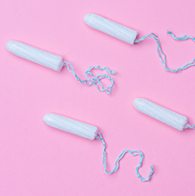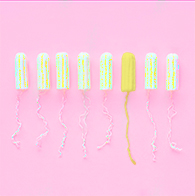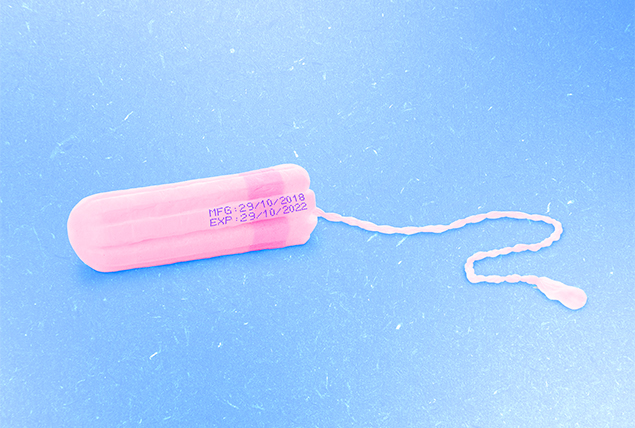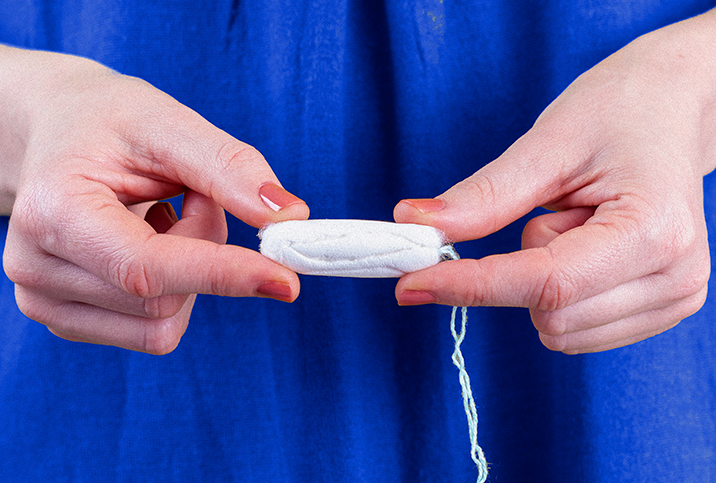Should You Switch to Organic Tampons?
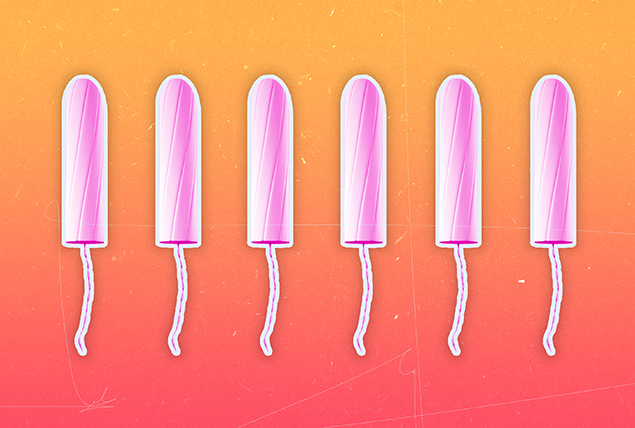
There is more demand for organic tampons than ever as consumers look to reduce their chemical exposure and help the environment. But how important is it to your health to use them? What's the difference between organic and inorganic tampons?
What should you know about the conventional tampon?
All tampons are considered to be medical devices and are regulated by the Food and Drug Administration (FDA). Manufacturers must submit testing results to prove the safety and effectiveness of their tampons.
Tampons enable women to swim and enjoy water-based activities during their period. By the end of 2031, the global market for tampons is expected to hit more than $8.3 billion, according to Yahoo Finance.
What does the FDA allow in a tampon?
The official FDA directive is "that tampons be free of 2,3,7,8- tetrachlorodibenzo-p-dioxin (TCDD)/2,3,7,8-tetrachloro furan dioxin (TCDF) and any pesticide and herbicide residues." They advise that tampons are bleached without elemental chlorine to help prevent harmful dioxin levels.
"Cotton, like a lot of other crops in the U.S., is often grown using pesticides and fertilizers. Also, the manufacturing process of tampons includes the use of chemicals to bleach, dye, fragrance, or improve the absorbency or texture of the fibers," said Kirti Patel, M.D., M.H.L., a gynecologist at UMass Memorial Healthcare in Harrington, Connecticut, and the chief medical officer at the POV, an online service to help women find a compassionate provider.
Phthalates, bisphenols, parabens and triclocarban (TCC) were all present in sanitary products, including tampons, as indicated in a 2020 study.
The chemicals are part of a group of chemicals termed endocrine disrupting chemicals (EDCs) and are believed to interfere with hormone function in the body.
EDCs have been linked to various health problems, including breast, uterine and ovarian cancer, and may stimulate the growth of uterine fibroids. Exposure to EDCs occurs in many ways. These are found throughout our environment, including in our water, food and air.
The presence of EDCs in personal care products is part of a much bigger picture. There are other considerations to make when choosing a type of tampon beyond a cardboard or plastic applicator.
What does it mean when a tampon is organic?
The ethos behind certified organic cotton tampons is simple: The certification means they contain fewer chemicals than non-organic tampons. But is that accurate? What's the story behind organic tampons?
"One of the main benefits is that these tampons are less likely to cause irritation or allergic reactions since they are made with natural, nontoxic materials," said Michael Green, M.D., an OB-GYN in Lake Arrowhead, California, and the chief medical officer at Winona, a telehealth company offering menopause care.
His answer echoes the theory regarding phthalates as a potential risk factor for bacterial vaginosis.
The move toward organic tampons may stem from wider concerns about chemical use in general, which is not specific or limited to tampon manufacturing.
"[There may be] unknown risks to all the chemicals that are used in the production and manufacture of so many products and foods in the U.S.," Patel said.
The impacts of EDCs are currently being researched to understand their potential long-term effects. However, tampons are generally regarded as safe when used as directed, as well as being FDA-approved, according to Patel.
"The scientific research on this is somewhat limited, but some women choose organic tampons for peace of mind," Green said.
Another consideration in favor of organic tampons is that they have a better impact on the environment compared with regular tampons, which can contain various types of plastic.
Green outlined some of the earth-friendly benefits of organic cotton tampons:
- They use biodegradable materials.
- They should not contain harmful chemicals that pollute soil and water.
- Some organic tampon companies also prioritize sustainable and ethical practices in their manufacturing processes.
- They may be made using renewable energy.
- They may support fair-trade cotton.
What do chemical use studies reveal about feminine hygiene products?
Sanitary pads contained more chemicals than tampons, but "most menstrual pads and tampons [were] not associated with meaningful non-cancer or cancer health risks," a 2021 study suggested.
However, the study did find "several menstrual pads, washes, sprays and powders with higher levels of toxic VOCs [volatile organic compounds], including benzene, n-heptane and 1,4-dioxane, that approach or exceed guidelines."
Their recommendation was for manufacturers to disclose their ingredients on the label and to remove any VOCs that were not "functional or aesthetic."
Pads also have a greater impact on the environment, according to a Natracare study that found there is 36 grams of plastic in an average pack of sanitary napkins (the equivalent of five plastic bags).
Greener alternatives that are gaining in popularity are reusable pads, period underwear and menstrual cups.
What are the drawbacks of organic cotton tampons?
Patel outlined the cons of organic tampons as follows:
- Usually more expensive
- Only available in certain stores
- Possibly less functional if the fibers have not been treated to increase absorbency
- May be more uncomfortable to insert due to biodegradable applicators
How can you use tampons safely?
It’s important to remember that the risks and guidelines of using tampons, organic or not, are exactly the same. The most serious complication associated with tampon use is toxic shock syndrome (TSS).
In the United States, 3 to 6 people per 100,000 are estimated to develop TSS every year, but only 1 in 100,000 is believed to be tampon-related, according to University of Utah Health.
Symptoms of toxic shock syndrome may include the following:
- Abdominal pain
- Fever
- Diarrhea
- Headaches
- Confusion
- Rash
- Low blood pressure
- Chills
- Nausea
- Vomiting
- Seizures
"You should seek immediate medical care if you develop these symptoms while using tampons, especially if you have left in a tampon too long," Patel said.
Follow these tips for how to use tampons safely:
- Clean hands before insertion.
- Follow the instructions on the packet.
- Always remove a tampon if it feels uncomfortable.
- Never wear a tampon for more than 8 hours.
- Keep tampons in a box to prevent damage.
- Throw away moldy or damaged tampons.
- Do not use expired tampons.
- Make sure the string is hanging out as a reminder that you have a tampon in and so that it can easily be removed.
- See a doctor if you have unusual discharge, odor, rash or soreness in the area as you could have bacterial vaginosis or a yeast infection.
The bottom line
The type of feminine hygiene product you use is a personal decision. Whether you choose organic tampons or traditional tampons, check the expiration date—tampons do expire. If something doesn't feel right, speak to your doctor for peace of mind.







